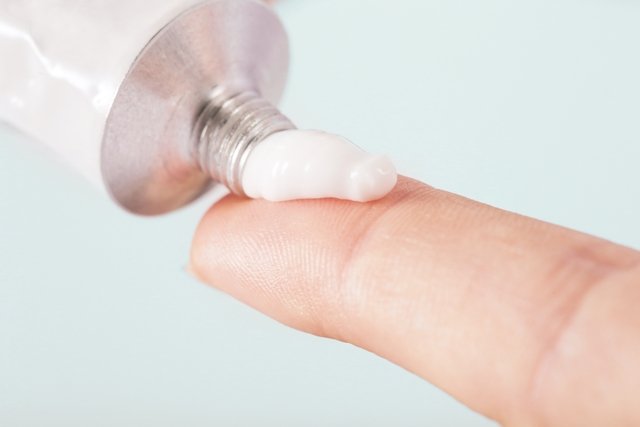Ointments for genital herpes, such as acyclovir ointment or penciclovir, may be recommended by your doctor to complement treatment with antiviral tablets, helping to reduce the duration of symptoms, facilitate skin healing and reduce the risk of recurrence or transmission. .
Genital herpes is a sexually transmitted infection (STI) caused by the herpes virus. Herpes simplex which can be transmitted through contact with a partner's genital fluids or blisters through unprotected sexual intercourse, leading to symptoms such as blisters or painful sores in the genital region. Know how to identify the symptoms of genital herpes.
Ointments for genital herpes should be recommended by a gynecologist, in the case of women, or a urologist, in the case of men, after evaluating the symptoms and confirming the diagnosis.

Main ointments for genital herpes
The ointments for genital herpes that may be recommended by your doctor are:
1. Acyclovir
Acyclovir 5% ointment reduces the multiplication of the Herpes simplex virus types 1 and 2, the infection of new cells, and decreases the duration of symptoms of initial or recurrent genital herpes.
This ointment can be found in pharmacies or drugstores under the trade names Zovirax or Hpmix, or in generic form under the name aciclovir sodium, and can be used from the first symptoms of recurrent genital herpes, such as itching or burning in the intimate area.
How to use: Apply a layer to the herpes blister or wound, 5 times a day, at intervals of about 4 hours, skipping application at night. The treatment must continue for at least 5 days and, if no healing occurs, the ointment must be used for another 5 days, or as per medical advice. After 10 days of treatment, if symptoms do not improve, you should see a doctor.
2. Penciclovir
Penciclovir is another ointment for initial or recurrent genital herpes, as it inhibits the multiplication of type 1 and 2 viruses, reducing the severity of the wounds and accelerating skin recovery and healing.
This ointment can be used from the first symptoms of recurrent genital herpes, being found under the name Penvir Labia.
How to use: Apply the ointment to the intimate area with a blister or wound, approximately every 2 hours, for 4 days, during the day. If symptoms do not improve within 4 days, you should consult your doctor again.
3. Lidocaine
Lidocaine is a local anesthetic that may be used to temporarily relieve the pain and discomfort of genital herpes blisters and sores.
This ointment can be found under the names Xylocaine 5% or 50 mg/g, and should not be used by pregnant or breastfeeding women.
How to use: Apply a small amount of the ointment, enough to cover the genital herpes blister or wound, in cases of severe pain, to relieve the pain, as advised by the doctor.
4. Silver sulfadiazine and cerium nitrate
Silver sulfadiazine and cerium nitrate ointment has antiviral action, against herpes simplex virus types 1 and 2, as well as healing and antimicrobial action, and may be recommended by the doctor, in some cases, for the treatment of skin and mucous membrane injuries. or to prevent secondary infections of the blister or wound.
This ointment can be found under the commercial name Dermacerium HS gel, sold in pharmacies or drugstores, and should not be used by pregnant or breastfeeding women.
How to use: Apply the ointment directly to the affected area on the genitals, about 3 times a day, until complete healing, as advised by the doctor.
5. Lysozyme hydrochloride
Lysozyme hydrochloride ointment is indicated to help treat genital herpes, applied directly to wounds or ulcers in the intimate region.
This ointment can be found under the name Murazyme and should only be used under medical advice.
How to use: Apply the ointment directly to the wounds or ulcerations caused by genital herpes, 2 to 3 times a day, after cleaning the intimate area.
6. Tromantadine
Tromantadine, or tromantadine hydrochloride, is an ointment in gel form indicated for the treatment of initial or recurrent genital herpes, helping to alleviate symptoms of itching or pain, reducing the severity and duration of the lesions.
This ointment must be used under medical advice, being found under the name Herpex gel, and should not be used on very large blisters or open wounds caused by genital herpes, in addition to being contraindicated in the first trimester of pregnancy.
How to use: Apply the gel to genital herpes lesions, covering them completely, at least 3 times a day, as per medical advice. After application, massage gently for better absorption. Check out other medications for genital herpes.
Natural ointments for genital herpes
Some natural ointment options for genital herpes are:
1. Uncaria tomentosa
A Uncaria tomentosaalso known as cat's claw, is a medicinal plant that has anti-inflammatory and analgesic action and can be indicated to help reduce the symptoms of genital herpes, such as itching and pain.
This ointment can be indicated for the treatment of herpes simplex, in order to alleviate symptoms, but it does not have antiviral action, that is, it does not reduce the multiplication of the herpes virus, and can be used to complement treatment with antiviral tablets or ointments to genital herpes.
And pomade de Uncaria tomentosa It can be found in pharmacies or drugstores, under the trade name Imunomax Gel-cream 50 mg/g, and should not be used during pregnancy or breastfeeding.
How to use: Apply a small amount of the ointment to the blister or wound in the genital region, every 8 hours, as per medical advice. See other benefits and how to use cat's claw.
2. Propolis
Propolis has anti-herpetic action that helps prevent the herpes simplex virus from spreading to other cells, in addition to having healing, analgesic and anti-inflammatory properties, reducing pain and swelling and improving skin healing.
Propolis ointment can be found in pharmacies or drugstores, under the name Amantikir Green Propolis Ointment.
Propolis should not be used by people with allergies to propolis, honey or pollen.
How to use: Apply a small amount of propolis ointment to the blister or genital wound, up to 3 times a day. Another way is to use propolis aqueous extract, applying 3 to 4 drops of the extract on the wounds, about 3 times a day. See other natural options for genital herpes.
Ointment for genital herpes during pregnancy
The most recommended ointment for genital herpes during pregnancy is acyclovir ointment, which should only be used on the advice of an obstetrician, after evaluating the benefits for the woman and potential risks for the baby. See how genital herpes is treated during pregnancy.
When to use ointments
Ointments for genital herpes are normally recommended by a gynecologist, in the case of women, or a urologist, in the case of men, to complement the initial treatment with antivirals in the form of tablets, such as acyclovir, penciclovir or valacyclovir. See how to take antivirals for genital herpes.
These ointments can be used for both primary genital herpes, which is the first manifestation of the infection, or recurrent, when there are new episodes of herpes. However, they should not be used when there are no signs of infection, as they do not prevent genital herpes attacks.
To find out the most suitable ointment for treating genital herpes, make an appointment with your nearest gynecologist:
Taking care of your health has never been easier!
Care when using ointments
Some precautions are important during treatment with genital herpes ointments, such as:
- Use the ointment at the correct times, as advised by the doctor;
- Wash your hands before and after applying the ointment, with water and neutral soap, to prevent the infection from worsening or spreading to other parts of the body;
- Avoid rubbing the blisters or wounds to avoid spreading them to other areas of the skin;
- Avoid intimate contact, even with a condom, while there are blisters or wounds in the genital region;
- Avoid sharing personal objects, such as towels or underwear;
- Wear cotton underwear to allow the skin to breathe and avoid the accumulation of moisture in the area.
In addition, if pain or burning occurs when urinating, you can move the edges of the genital region apart, in the case of women, so that the urine does not irritate the lesions or cause more pain or discomfort, or urinate with the genitals immersed in warm water.
Read too: Herpes: what it is, symptoms, types, transmission and treatment



